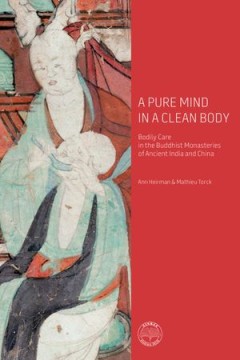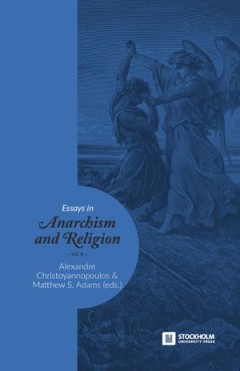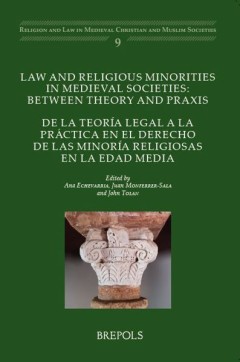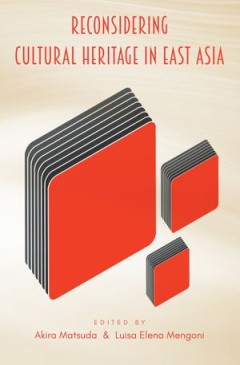Filter by

A Pure Mind in a Clean Body Bodily Care in the Buddhist Monasteries of Ancie…
Buddhist monasteries, in both Ancient India and China, have played a crucial social role, for religious as well as for lay people. They rightfully attract the attention of many scholars, discussing historical backgrounds, institutional networks, or influential masters. Still, some aspects of monastic life have not yet received the attention they deserve. This book therefore aims to study some o…
- Edition
- -
- ISBN/ISSN
- 9789038220147
- Collation
- -
- Series Title
- -
- Call Number
- -

Essays in Anarchism and Religion: Volume 1
"Anarchism and religion have historically had an uneasy relationship. Indeed, representatives of both sides have regularly insisted on the fundamental incompatibility of anarchist and religious ideas and practices. Yet, ever since the emergence of anarchism as an intellectual and political movement, a considerable number of religious anarchists have insisted that their religious tradition neces…
- Edition
- -
- ISBN/ISSN
- 9789176350430
- Collation
- -
- Series Title
- -
- Call Number
- -

The Legal status of ḏimmī-s in the Islamic West
The first monograph devoted to the legal status of religious minorities status accorded to dimmī-s ( Jews and Christians) in the Muslim law in the medieval Muslim west (the Maghreb and Muslim Spain). The articles in this volume provide numerous examples of the richness and complexity of interreligious relations in Medieval Islam and the reactions of jurists to those relations. The studies brou…
- Edition
- -
- ISBN/ISSN
- 9782503548548
- Collation
- -
- Series Title
- -
- Call Number
- -

Religious Minorities in Christian, Jewish and Muslim Law (5th - 15th centuries)
The fruit of a sustained and close collaboration between historians, linguists and jurists working on the Christian, Muslim and Jewish societies of the Middle Ages, this book explores the theme of religious coexistence (and the problems it poses) from a resolutely comparative perspective. The authors concentrate on a key aspect of this coexistence: the legal status attributed to Jews and Muslim…
- Edition
- -
- ISBN/ISSN
- 9782503565712
- Collation
- -
- Series Title
- -
- Call Number
- -

Religious minorities, integration and the State / État, minorités religieus…
Judaism, Christianity and Islam have coexisted in Europe for over 1300 years. The three monotheistic faiths differ in demography, in the moment of their arrival on the continent and in the unequal relations they maintain with power: Christianity was chosen by a large number of inhabitants and became — in spite of important differences according to place and time —a religion of state. The or…
- Edition
- -
- ISBN/ISSN
- 9782503564999
- Collation
- -
- Series Title
- -
- Call Number
- -

Essays in Anarchism and Religion
"Anarchism and religion have historically had an uneasy relationship. Indeed, representatives of both sides have regularly insisted on the fundamental incompatibility of anarchist and religious ideas and practices. Yet, ever since the emergence of anarchism as an intellectual and political movement, a considerable number of religious anarchists have insisted that their religious tradition neces…
- Edition
- -
- ISBN/ISSN
- 9789176350720
- Collation
- -
- Series Title
- -
- Call Number
- -

Expulsion and Diaspora Formation
The eleven essays brought together in this volume explore the relations between expulsion, diaspora, and exile between Late Antiquity and the seventeenth century. The essays range from Hellenistic Egypt to seventeenth-century Hungary and involve expulsion and migration of Jews, Muslims and Protestants. The common goal of these essays is to shed light on a certain number of issues: first, to try…
- Edition
- -
- ISBN/ISSN
- 9782503555256
- Collation
- -
- Series Title
- -
- Call Number
- -

Jews and Christians in Medieval Europe
The name of Bernhard Blumenkranz is well known to all those who study the history of European Jews in the Middle Ages and in particular the history of Jewish-Christian relations. Blumenkranz was born in Vienna in 1913; he left for Switzerland during the war and obtained a doctorate at the University of Basel on the portrayal of Jews in the works of Augustine. He subsequently moved to France whe…
- Edition
- -
- ISBN/ISSN
- 9782503565166
- Collation
- -
- Series Title
- -
- Call Number
- -

Law and Religious Minorities in Medieval Societies
This volume shows through the use of legal sources that law was used to try to erect boundaries between communities in order to regulate or restrict interaction between the faithful and the non-faithful; and at the same time shows how these boundaries were repeatedly transgressed and negotiated. Muslim law developed a clear legal cadre for dhimmīs, inferior but protected non-Muslim communities…
- Edition
- -
- ISBN/ISSN
- 9782503566948
- Collation
- -
- Series Title
- -
- Call Number
- -

Reconsidering Cultural Heritage in East Asia
The concept of ‘cultural heritage’ has acquired increasing currency in culture, politics and societies in East Asia. However, in spite of a number of research projects in this field, our understanding of how the past and its material expressions have been perceived, conceptualised and experienced in this part of the world, and how these views affect contemporary local practices and notions …
- Edition
- -
- ISBN/ISSN
- 9781909188891
- Collation
- -
- Series Title
- -
- Call Number
- 301 REC r
 Computer Science, Information & General Works
Computer Science, Information & General Works  Philosophy & Psychology
Philosophy & Psychology  Religion
Religion  Social Sciences
Social Sciences  Language
Language  Pure Science
Pure Science  Applied Sciences
Applied Sciences  Art & Recreation
Art & Recreation  Literature
Literature  History & Geography
History & Geography